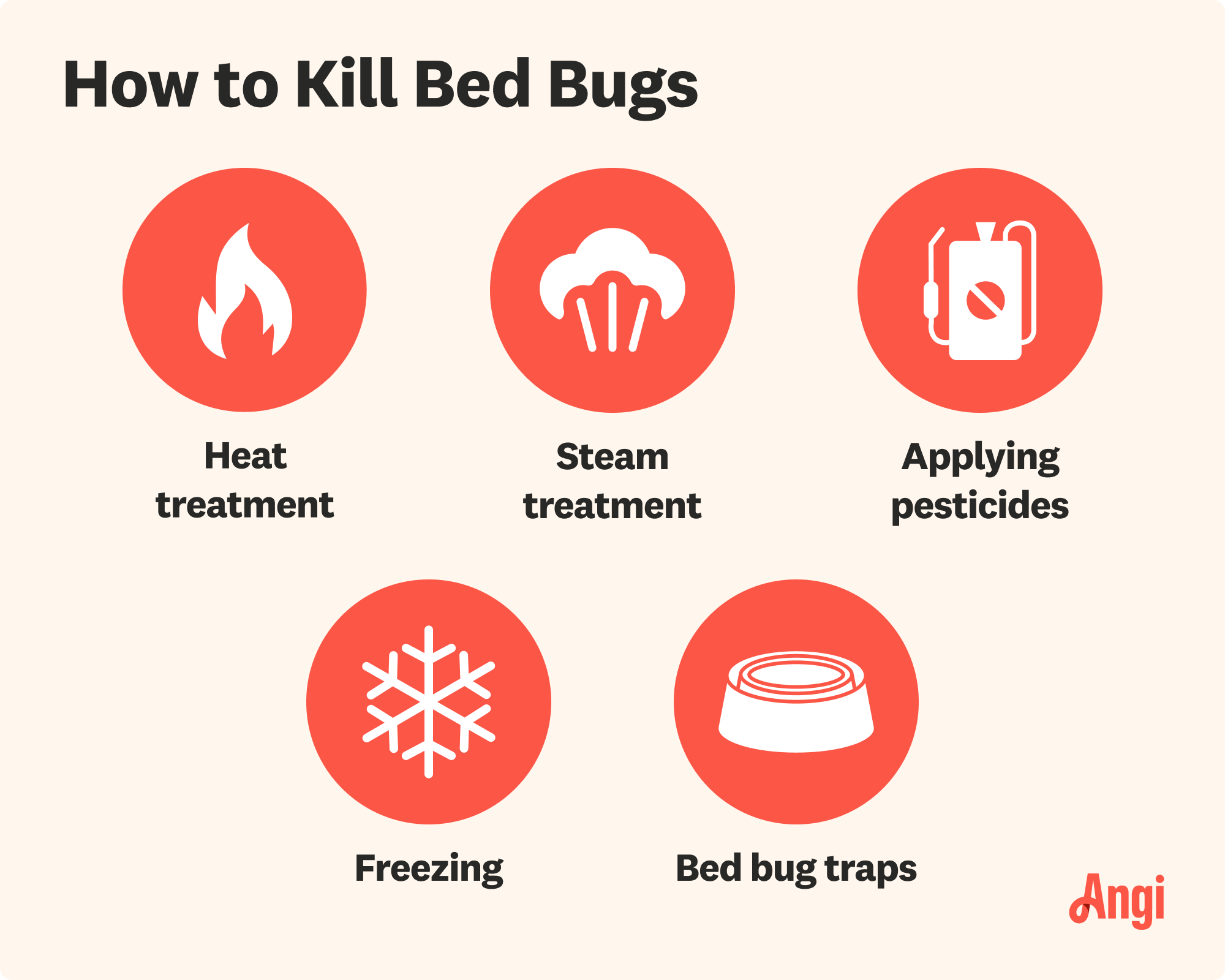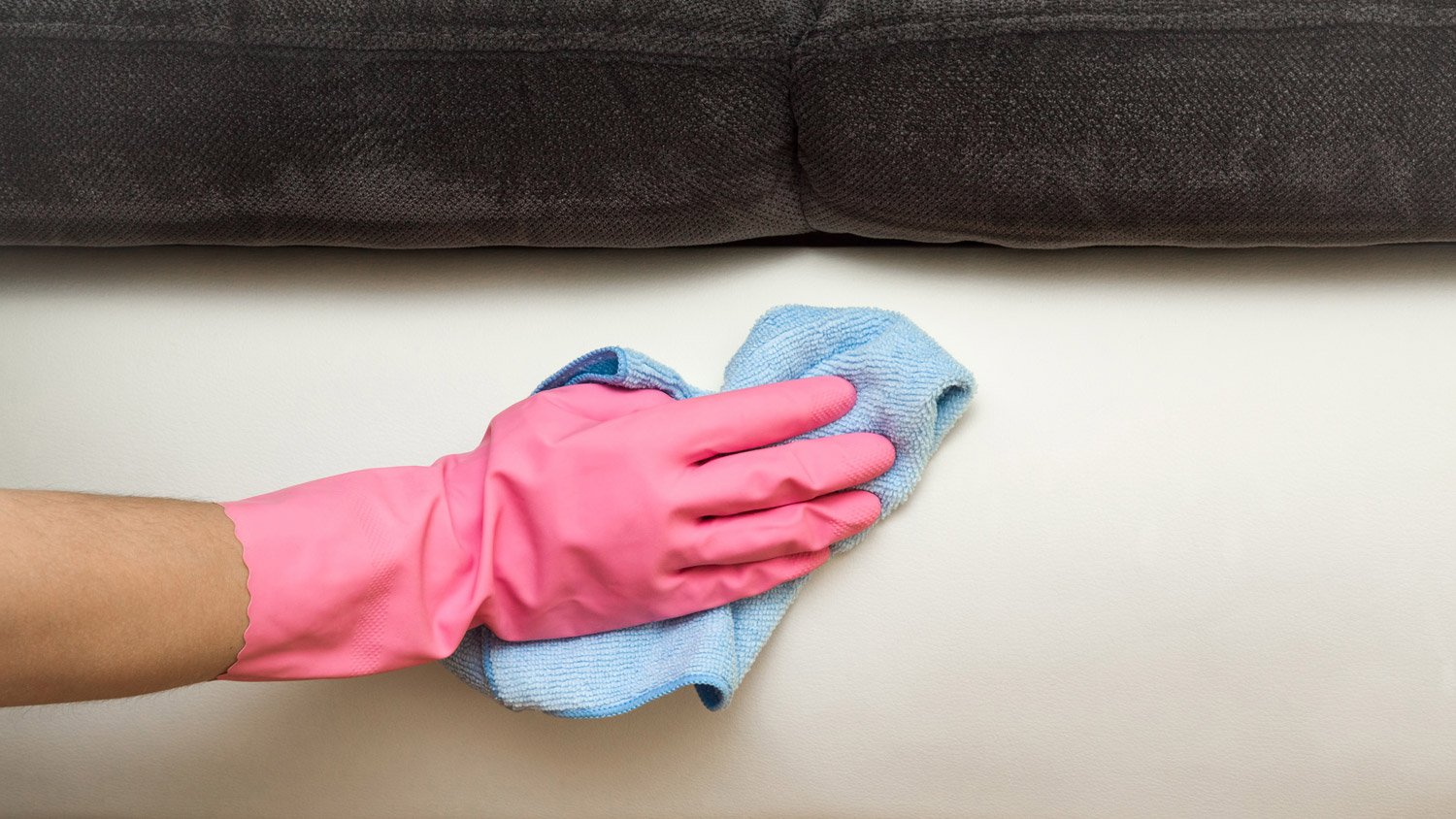
The invasive spotted lanternfly makes a mess and causes serious damage to the environment. So, how much does spotted lanternfly treatment cost?
Kill those pesky pests with these DIYs


DIY treatments include high heat, bleach, alcohol, and diatomaceous earth.
Rubbing alcohol, salt, baking soda, and boric acid are not effective.
Certain essential oils repel bed bugs but won’t kill them.
Diatomaceous earth is an effective passive method of bed bug treatment.
Professional exterminators perform highly-effective whole-room treatments.
Bed bugs are ruthless invaders, and they’re notoriously tricky to eradicate since they reproduce quickly and are quite adept at finding places to hide.
So, what kills bed bugs instantly? Note that most targeted treatments can’t totally wipe out the insects, as they won’t reach any that are hidden deep within the cracks and crevices. For major infestations, you’ll likely need to enlist the skills of a local bed bug control specialist. In the meantime, let’s review some of the most popular DIY methods and whether they are effective at killing bed bugs.
If your bed bug problem doesn't resolve itself after implementing DIY removal methods, it's time to call in a professional exterminator. Don't hesitate to take pest control action to prevent the infestation from growing.

Check out these methods for getting rid of bed bugs quickly and permanently.
A temperature of 131 degrees Fahrenheit can kill adult bed bugs and eggs when exposed for at least 72 minutes, according to the NCBI report. Steam or hot water can be an effective treatment, but it can be difficult to sustain the high temperature for long enough.
You have several options when using heat to swiftly kill the bugs:
Put blankets, bedding, and clothes in a dryer on the hottest setting for a few hours. This is typically enough to kill bed bugs and their eggs.
Use a dedicated steam cleaning tool to reach all the crevices in mattresses and furniture. This is an excellent way to handle bed bugs, but you’ll want a heavy-duty steaming tool. Consider renting one if necessary.
Hire a bed bug pro to use professional-grade equipment to seal up a bed, couch or even an entire room and heat it to the right temperature so every pest dies inside.
Rubbing alcohol is somewhat effective at killing bed bugs, but isn’t likely to be effective at eradicating an infestation. A study performed by Rutgers University found that spraying bugs with a solution of either 70% or 91% isopropyl alcohol only killed a maximum of 50% of the insects. It also won’t kill any nymphs or eggs. What’s more, alcohol is highly flammable, so it’s not a safe choice for dousing your bed and belongings.
Diatomaceous earth is a popular non-chemical bed bug treatment that can be highly effective against the insects. This sharp, natural powder has an abrasive and dehydrating effect on bed bugs, which can kill them on contact. To use it, dust a light layer on mattresses, baseboards, furniture, and wherever else the insects may be hiding. Be sure to use food-grade diatomaceous earth so it isn’t toxic to children and pets.
Silica gels are powerful desiccants that absorb moisture from bed bugs. They’re safer to use in the home than pesticides and can be very effective at killing bed bugs up to two days after application. You can use silica gel treatments in combination with other practices to quickly kill the bed bugs and help ensure they don’t return.
Keep in mind that silica gel is a spot treatment and can’t remove infestations on its own. You can quickly kill bed bugs in a mattress, but the larger bed bug problem often needs additional steps and help from a professional exterminator.
Fumigation, house tenting, or bug bombs are a last resort option when an infestation has grown too widespread. Pest control management practices differ on the use of fumigation, with some suggesting it and some trying to avoid it. Overall, fumigation is more common for commercial buildings than homes. Powerful airborne pesticides from fumigation can cause health issues and even damage fragile materials. In some cases, bed bugs can burrow down far enough to survive and eventually return. Many local bed bug companies recommend heat remediation instead of fumigation. Heat is nontoxic, equally effective, and safer for residential homes.
Yes, bleach can kill bed bugs instantly. To use it, wash clothing and any other items you can fit in your washing machine with hot water, bleach, and detergent. Follow this with a cycle in the dryer at the highest heat setting possible.
To kill insects on contact, you can also mix equal parts hot water and bleach to create a potent spray. Take care not to splash any bleach on colored clothing or fabrics, and wear protective eyewear and gloves.
Lysol and similar disinfectants that have isopropyl alcohol, ethanol, or ethyl alcohol as an active ingredient can be very effective at killing bed bugs instantly. Since these ingredients have been proven to be lethal to the insects, using spray disinfectants can also kill bed bugs on contact, with the added benefit of disinfecting the area at the same time.
Vinegar can kill bed bugs due to its acetic acid, a potent and toxic ingredient. Acetic acid can damage a bed bug’s nervous system on contact, potentially leading to its demise.
Similar to bleach, hydrogen peroxide has the potential to kill bed bugs. However, while not as damaging as bleach, it still has the potential to discolor certain dyed fabrics and upholstery.
Pyrethroids such as Permethrin, desiccants, pyrroles, and other chemical insecticides are capable of killing bed bugs. However, there are some risks to using pesticides for bed bug treatment. They may take time to work, so they won’t kill bed bugs instantly. They’re also toxic to humans and animals, so they can be hazardous to use around children and pets.
When taking on this project, expect questions only a pro can answer. With our network of local pros, you'll get the job done and your questions answered—without the hassle and stress of doing it yourself.

There are a few eradication methods and household goods that won’t work well to kill bed bugs instantly. Check out the options to avoid:
Paint thinner is one of the classic suggestions to kill bed bugs, but it’s best to avoid it. While a bad infestation can make you feel desperate enough to try anything, don’t apply paint thinner to your mattress, furniture, or clothes. While it can kill bed bugs on contact, this powerful solvent is toxic and highly flammable. People have accidentally lit their beds on fire with this method—we do not suggest it.
While ammonia has been used as an ingredient in some bed bug sprays in the past, we don’t recommend it. These powerful chemicals can kill bed bugs on contact, but they invite similar problems as paint thinner. Ammonia fumes are toxic in high amounts and bed bugs can easily hide away from direct application, which is why the Environmental Protection Agency (EPA) and other agencies do not recommend using it. Heat applications are a safer and more effective way to kill bed bugs quickly.
Baking soda may be effective against bed bugs, since the powder can dehydrate their bodies. However, there’s no scientific evidence to support baking soda as a lethal treatment against the insects, so it isn’t ideal to use as your only method.
Boric acid is a stomach poison, and won’t kill a bed bug unless they ingest it. While this proves effective for many pesky insects, it’s not likely to work against bed bugs. Since bed bugs feed solely on blood, they probably won’t consume the boric acid dust.
While salt is effective at drying out snails and slugs, it won’t have the same impact on bed bugs. Diatomaceous earth will typically be a much more effective solution for killing bed bugs than salt.
Bed bugs are notorious for living through extermination attempts, which means efforts to kill them have to be very thorough. Follow these tips to help make it less likely they will return:
Don’t forget your vehicle: Bed bugs notoriously hitch rides from other people’s homes or hotel rooms. That means they can also linger in vehicles. Thorough clean and treat your vehicle along with bedding and other key items in your home.
Wash and treat fabric: When infestations escalate, bed bugs can be found in sofas, carpet, pet beds, luggage, curtains and, of course, lots of laundry. It pays to be thorough and treat all kinds of fabric where bed bugs may linger.
Set a week of vacuuming: Vacuum helps remove clutter and suck up errant bed bugs, especially at higher suction levels. When treating your home, try to arrange a vacuuming session every day for the corners, baseboards, and mattress or furniture where bed bugs have been found. This is a great way to pick up stragglers and eggs.
Protect and isolate your bed: Bed bugs don’t magically appear on your bed—they have to climb there. Part of bed bug treatment includes moving your bed away from the walls. You can also tape the legs of your bed so bugs can’t climb up or surround your bed with diatomaceous earth.
Wrap your bed in plastic: If the mattress is the center of a bed bug infestation, it’s a good idea to fully seal it in a plastic mattress cover for around 3 months after cleaning. This will generally kill remaining bed bugs.
Don’t be afraid to call pest control: Pest control companies have dedicated tools to deal with bed bugs, including on-the-spot heating. It can be expensive, but it’s often the best way to make sure that the bugs are gone for good.
Don’t use sticky traps: While these may have pesticides in them, they aren’t effective at capturing bed bugs and getting rid of them.
Do you suspect bed bugs because of itching or some mysterious skin marks? It can be difficult to spot bed bugs when the infestation is small, but it’s very important to catch them early. Here are examples of the clearest evidence that you have a bed bug problem:
Bed bugs hidden in the corners: Bed bugs hide in the corners and cracks of the mattress, under cushions, and similar areas They’ll look like a collection of small, reddish dots or flakes that will move around when disturbed. If you see these gatherings of bugs, you know you have a problem.
Unexpected specs on clean sheets: Tiny brown or dark stains on sheets are another common sign of bed bugs. These little smears are caused by crushed bugs and small bug feces, as well as small drops of blood from their bites. When combined with the itchy rashes that bed bugs create, it’s a clear sign of an infestation.
White dots on mattress or furniture: White dots can be caused by bed bug moltings or eggs that bed bugs have laid, another sign of an infestation that may be more obvious on dark fabrics or the underside of mattresses.
A distinct odor: When bed bugs start gathering in numbers, they begin to have a noticeable scent. It’s usually described as sweet and musty, a bit like berries starting to go bad. That’s a sign you’re on the right track.
While many of these methods can kill bed bugs on contact, wiping out an infestation is an entirely different story. Bed bugs hide in every nook imaginable, from your box spring to your electrical outlets, so it’s extremely difficult to reach every single insect for targeted treatments.
Bed bug extermination costs between $1,000 and $2,500 and is often the best route to go for serious infestations. If you want to get rid of bed bugs quickly and permanently, a professional exterminator has access to the most potent and widespread methods of eradicating all the bugs, nymphs, and eggs in your home.
Bed bugs and humans have been at odds forever: One reason is because our homes make perfect spots for these bugs to thrive and grow. It only takes a couple of bugs to start an infestation, especially if they’re ready to lay eggs. Unlike many pests, bed bugs are not attracted to decaying wood or similar materials, chemicals, or human food.
Here’s why bed bugs want to take up residence in your home:
Warmth: Bed bugs are attracted to warm areas, specifically the warmth of human bodies. That warmth also indicates the best spots on the human body to feed, which is why they congregate in areas we lay or sit frequently.
Carbon dioxide: Like many insects that feed on humans, bed bugs are attracted to the smell of carbon dioxide, which we produce whenever we exhale.
Other bed bugs: Bed bugs emit their own chemical signatures that can attract other bed bugs. That explains how they can easily congregate in the same hiding spots deep in the seams of a mattress or couch.
Dark bedding: It may sound odd, but bed bugs are attracted to color, especially colors that make it easier for them to hide. Dark and reddish bedding seems to be their favorite, while light-colored bedding is less likely to attract them.
Dirty laundry: Dirty laundry is filled with the traces of humans, which can attract new bed bugs looking for places to set up shop. A laundry hamper can be a popular gathering spot, especially if clothes haven’t been washed in a while.
Stressed homeowners will be happy to know that bed bugs make up only 0.2% of pest control visits. Much more common are cockroaches, accounting for nearly half of exterminator trips, and ants. Homes are also commonly treated for stinging insects like bees, wasps, and hornets.
From average costs to expert advice, get all the answers you need to get your job done.

The invasive spotted lanternfly makes a mess and causes serious damage to the environment. So, how much does spotted lanternfly treatment cost?

Find out how much it costs to remove armadillos and stop them from coming back. Know how much to budget to humanely remove these pesky critters from your yard.

When calculating the cost of hiring a flea exterminator, consider your home size and the infestation extent. This guide will help you figure out what to budget.

Learn how to keep coyotes away from your home. Simple strategies to help stop crafty coyotes from using your yard as a crash pad.

Cockroaches are drawn to the warmth and darkness provided by appliances. To prevent an infestation, learn how to get roaches out of appliances for good.

Nobody wants to tangle with wasps on their property, as these insects sting with extreme prejudice. Here’s how to get rid of wasps safely and for good.